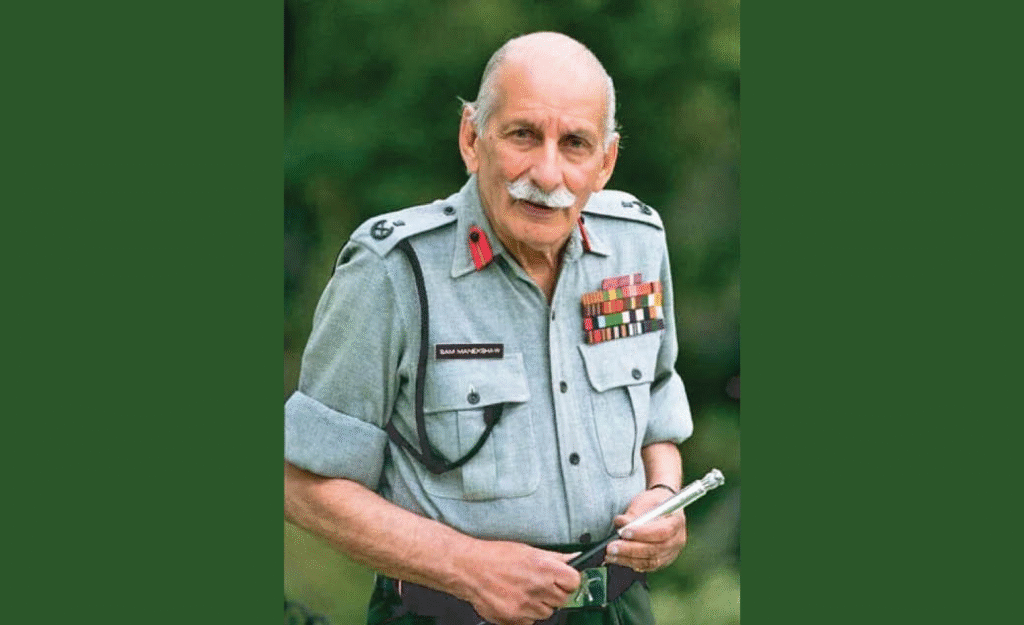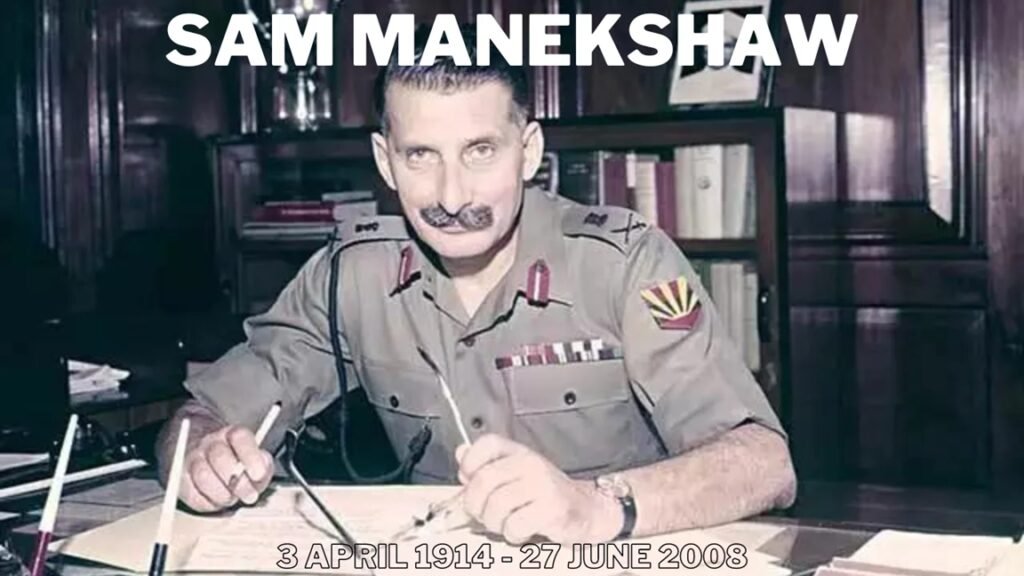Few names in Indian military history shine as brightly as that of Field Marshal Sam Hormusji Framji Jamshedji Manekshaw. A charismatic leader, strategic genius, and a man of iron will and wit, Sam Manekshaw is celebrated not only for his pivotal role in shaping India’s military legacy but also for his immense contribution to the victory in the 1971 Indo-Pak war, which led to the creation of Bangladesh.
This article explores Sam Manekshaw’s bio, age, and legendary life—from his humble beginnings and military exploits to his enduring legacy as India’s first Field Marshal.

Early Life and Background
Sam Manekshaw was born on April 3, 1914, in Amritsar, Punjab, during British colonial rule. He belonged to a Parsi family, originally from Valsad, Gujarat. His father, Dr. Hormusji Manekshaw, was a practicing doctor, and his mother was Heerabai.
Raised in a disciplined yet intellectually stimulating environment, young Sam was an intelligent and fearless child. He was educated at Sherwood College in Nainital, and later aspired to study medicine in England. Field Marshal Sam Manekshaw: However, fate had other plans.
Entry into the Armed Forces
In 1932, when the Indian Military Academy (IMA) in Dehradun was established, Manekshaw was among the first batch of 40 cadets. He was commissioned into the British Indian Army on December 1, 1934, and was posted to the 2nd Battalion of the Royal Scots, later transferring to the 12th Frontier Force Regiment.
Military Career and Rise Through the Ranks
World War II Heroism
Sam Manekshaw’s first real test came during World War II, where he served with valor in Burma (now Myanmar). In 1942, during the Battle of Sittang Bridge, he was severely wounded when machine gun fire hit him in the stomach. Believing he was going to die, his bravery was recognized on the battlefield, Field Marshal Sam Manekshaw: and he was awarded the Military Cross for gallantry.
Doctors initially refused to treat him, assuming he was beyond saving, but thanks to a British doctor who insisted on treating him, he survived—this act of courage set the tone for a life full of grit Field Marshal Sam Manekshaw: and determination.
Post-Independence Contributions
After India gained independence in 1947, Sam Manekshaw opted to serve in the Indian Army. Over the next two decades, he took on various critical roles including:
- Director of Military Operations
- Commandant of the Defence Services Staff College
- GOC-in-C Eastern Command
Manekshaw played important roles in India’s first major conflicts, including the 1947 Indo-Pak war, Sino-Indian War of 1962, and Indo-Pak war of 1965, offering his experience and strategic vision to reorganize and strengthen India’s defenses.
Age and Tenure as Chief of Army Staff
By the time Sam Manekshaw became the 8th Chief of Army Staff on June 8, 1969, he was already a living legend. He was 55 years old when he assumed the position, and under his leadership, Field Marshal Sam Manekshaw: the Indian Army underwent significant modernization.
He remained in this role until January 15, 1973, when he was promoted to Field Marshal, becoming the first Indian Army officer to receive this prestigious five-star rank.
The 1971 Indo-Pak War: His Finest Hour
Sam Manekshaw’s most iconic achievement came in 1971, during the India-Pakistan War. At the time, tensions were high due to the Bangladesh Liberation Movement, where millions of refugees were fleeing from East Pakistan into India.
Strategic Planning
When then-Prime Minister Indira Gandhi asked Manekshaw for immediate military intervention, he refused to be rushed. Instead, he boldly told her:
“I guarantee you 100% victory if you allow me to prepare and choose my time.”
This strategic patience allowed Indian forces to mobilize, train, and equip themselves thoroughly. When war finally broke out in December 1971, Manekshaw’s planning led to India’s swift and decisive victory in just 13 days — one of the fastest military victories in history.
Surrender of 93,000 Pakistani Troops
Under his leadership, the Indian Army executed brilliant tactics, leading to the surrender of 93,000 Pakistani troops—the largest surrender since World War II. This war led to the creation of Bangladesh and cemented Sam Manekshaw’s place in military history.

Leadership Style and Personality
Sam Manekshaw was not just known for his military acumen, but also for his wit, charm, and fearlessness. He often used humor to disarm tension Field Marshal Sam Manekshaw: and inspired deep loyalty among his troops. His leadership style was based on:
- Leading by example
- Being blunt and honest
- Prioritizing soldier welfare
- Never seeking political favor
A famous quote of his sums up his approach:
“If a man says he is not afraid of dying, he is either lying or he is a Gorkha.”
This line highlighted his deep respect for his troops, especially the fierce Gorkha regiment.
Honors and Achievements
Over his illustrious career, Sam Manekshaw received numerous awards and honors:
- Military Cross (MC) – for bravery in WWII
- Padma Vibhushan – India’s second-highest civilian award
- Padma Bhushan – India’s third-highest civilian award
- Field Marshal Rank (1973) – highest military designation
- Numerous international accolades and honorary military tributes
He was widely respected not just in India, but also by foreign defense leaders who admired his professionalism and strategy.
Retirement and Final Years
Field Marshal Manekshaw retired in 1973 and settled in Coonoor, Tamil Nadu. Despite his towering legacy, he lived a simple and quiet life, occasionally giving lectures Field Marshal Sam Manekshaw: and engaging in public affairs.
He remained vocal about military preparedness and national security but never entered politics, staying true to his role as a military man.
Death and Legacy
Field Marshal Sam Manekshaw passed away on June 27, 2008, at the age of 94. His death marked the end of an era, but his legacy lives on through:
- Statues, memorials, and military bases named in his honor
- Books and documentaries detailing his life
- Inspiration for military training and leadership philosophy
- A symbol of national pride and integrity
Despite his service and fame, it’s worth noting that he was not given a state funeral, which led to some controversy. However, among the armed forces and citizens alike, Field Marshal Sam Manekshaw: his legacy remains untarnished.
Interesting Facts About Sam Manekshaw
- He once joked with Prime Minister Indira Gandhi during the 1971 war:
“I am always ready, sweetie!” (in response to being ready for war). - He was offered the top military post of Pakistan before Partition but declined, choosing India instead.
- Sam was known to speak fluent Punjabi, Gujarati, and English, making him popular among troops from different regions.
- Despite being a Parsi, he often celebrated Hindu, Muslim, and Christian festivals with his men, promoting unity.
Conclusion
Field Marshal Sam Manekshaw is not just a name in Indian history books — he is a legend whose courage, wisdom, and leadership redefined India’s military doctrine. His legacy is not just in the battles he won, Field Marshal Sam Manekshaw: but in the hearts of the soldiers he inspired and the nation he protected.
In an age where true leadership is rare, Sam Manekshaw remains a timeless role model — a man who spoke his mind, led with courage, Field Marshal Sam Manekshaw: and placed the nation above all.
Read more https://magazinesnove.com/indian-navy-marcos-commando-salary-in-2025/


